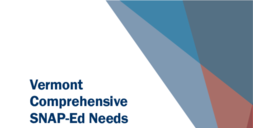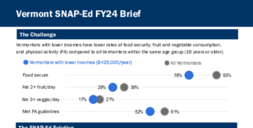
You may have heard of the Supplemental Nutrition Assistance Program, or SNAP—a federal program that helps income-eligible individuals and families access fresh, healthy food. Vermont’s version of SNAP is called 3SquaresVT.
A related program, called SNAP-Education, or SNAP-Ed, supports 3SquaresVT-eligible people by providing funding to local organizations that fill two important roles:
- Assisting people with how to grow, find, buy, store, and prepare healthy, fresh food.
- Inspiring and supporting people to get regular physical activity.
SNAP-Ed’s priority populations include:
- Single parent households with children under 18, especially those with children under five
- People of color
- Indigenous populations
- Immigrants and refugees
- People living with a disability
- Rural Vermonters
- Older adults
- People who are unhoused
- Youth, specifically middle and high school students
- LGBTQ+ people, recognizing many individuals and households hold many of these identities at the same time.






